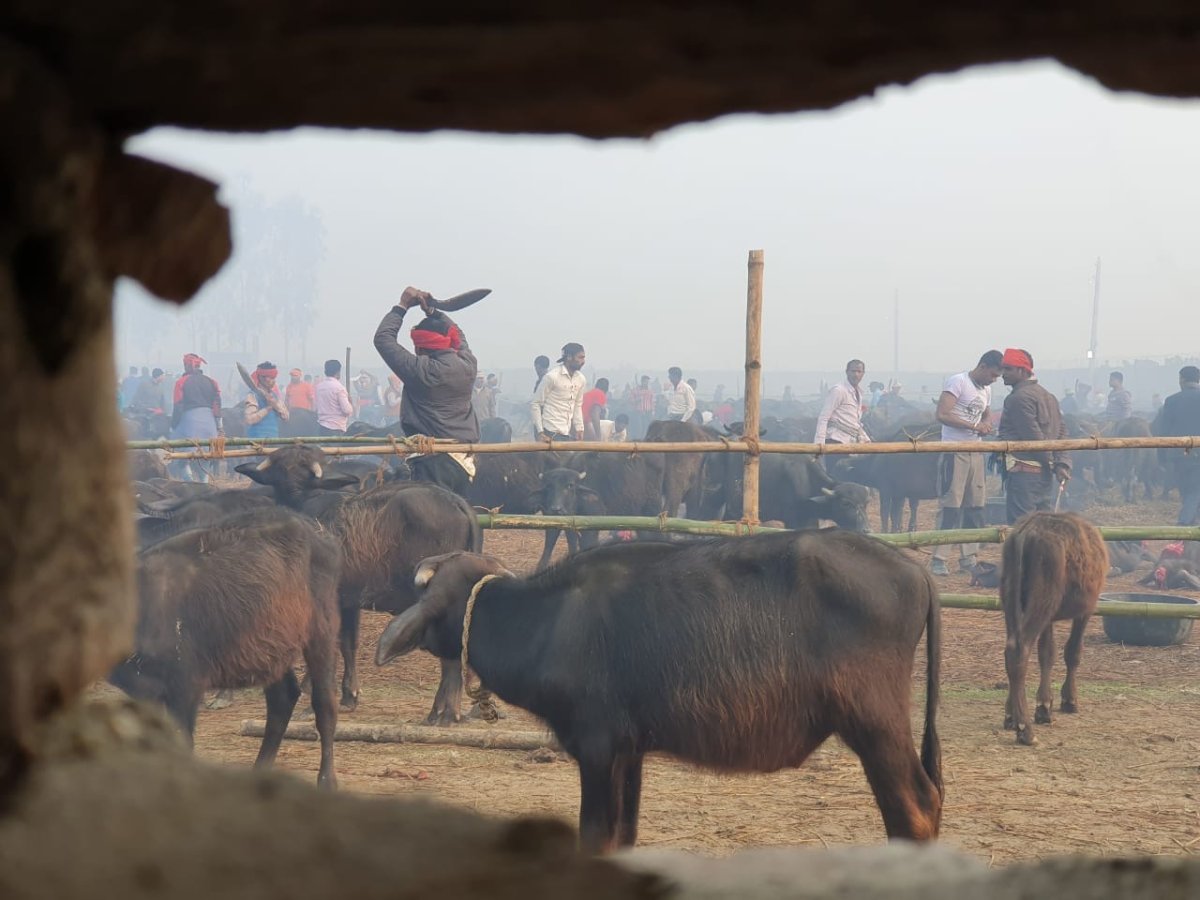An estimated 3,500 buffaloes were ritually beheaded as part of Nepal's Gadhimai festival during the early hours of the morning Tuesday. However, the number of animals slaughtered was down significantly on previous years, according to Humane Society International (HSI).
The festival takes place every five years at the Gadhimai Temple in Nepal's Bara district in honor of the goddess Gadhimai. Celebrations culminate with the world's largest single animal sacrifice event, during which tens to hundreds of thousands of creatures—ranging from water buffalo to pigeons—are ritually slaughtered.
In 2009, the killing peaked with an estimated 500,000 animals killed. However, due to the sustained efforts of local and international animal rights groups, this number fell significantly to around 30,000 in 2014. And it appears that this year, the scale of the slaughter has been drastically reduced again to 3,500.
"As devastating as this was for Humane Society International/India's team to witness, we can report that the death toll was many thousand fewer animals that at previous events, thanks largely to the determined efforts of animal groups such as ourselves over the past year," HSI spokesperson Wendy Higgins said in a statement provided to Newsweek.
Despite the fact that the scale of the slaughter has been reduced, animal rights campaigners reported witnessing brutal scenes, including baby buffaloes crying for their mothers as they watched them being beheaded in the main temple arena. Furthermore, many animals collapsed as a result of exhaustion, sickness and stress.
Before the slaughter, animal rights activists had pleaded with the head priest of Gadhimai Temple, Mangal Chowdhury, to stop the killing, however, he allegedly refused to take action.
In 2015, the Gadhimai Temple trust made a pledge to ban the killing of buffaloes in the main arena in what was seen at the time as a win for activists. However, the temple later reneged on this promise.
"Being here at the Gadhimai sacrifice is one of the most depressing and challenging experiences of my life," said Alokparna Sengupta, Humane Society International/India's managing director. "The suffering of these animals is so upsetting, they have endured exhausting journeys to get here and are paraded in front of a baying crowd as all around them they witness other animals being decapitated one by one. The hysteria and apparent jubilation at seeing confused and frightened animals being slaughtered was very disturbing."
According to HSI, an estimated 70 percent of the animals slaughtered at the festival in previous years were imported across the Indian border. In 2014, the Indian Supreme Court passed a law in a bid to stop this illegal movement of animals, however, the rules are often flouted openly.
But this year, activists worked with officials at the India-Nepal border, who seized hundreds of animals and prevented them from being brought to the slaughter.

In addition to these efforts at the border, rights groups—including HSI and local non-profit organizations such as Federation of Animal Welfare Nepal and People for Animals—conducted a series of public awareness campaigns urging people not to bring animals to slaughter at the festival.
And while overturning centuries of tradition among the hundreds of thousands people who participate in the festival was always going to be an extremely difficult task, it appears that the message did get through to some.
Some members of the Dalit community—the lowest social group in the Hindu caste system—who traditionally have been given the grim task of slaughtering the animals, refused to carry out the killing this year, according to HSI.
"Confronted with such terrible scenes of animal slaughter, we take comfort from knowing that many thousands more animals would have died but have been spared this massacre due to the combined efforts of animal groups, multi-faith groups and the Indian border force," Sengupta said.
"We helped save hundreds of baby goats, pigeons and buffaloes at the border, and devotees have brought thousands fewer buffaloes than at previous Gadhimai events. We may not have a bloodless Gadhimai this time, but we are determined that one day we will see an end to this gruesome spectacle."
Uncommon Knowledge
Newsweek is committed to challenging conventional wisdom and finding connections in the search for common ground.
Newsweek is committed to challenging conventional wisdom and finding connections in the search for common ground.
About the writer
Aristos is a Newsweek science reporter with the London, U.K., bureau. He reports on science and health topics, including; animal, ... Read more
To read how Newsweek uses AI as a newsroom tool, Click here.








